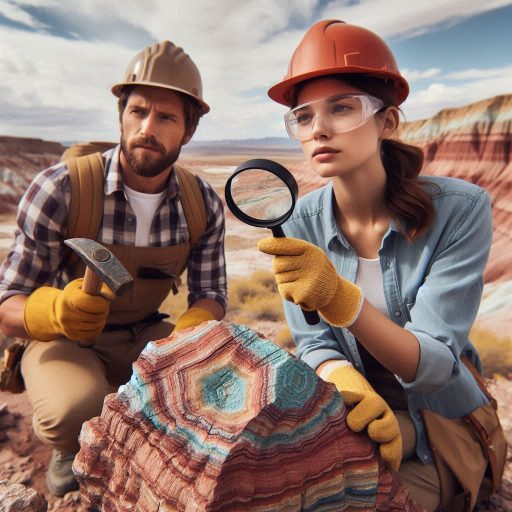Introduction
Geology is the study of Earth‘s physical structure, composition, and processes.
It examines rocks, minerals, and natural phenomena.
Geologists explore how Earth‘s materials interact over time.
Their work provides insights into environmental challenges, natural resources, and hazards.
In a successful geology career, specific skills are crucial.
These skills enable geologists to conduct research, analyze data, and solve problems.
Strong analytical skills help geologists interpret complex geological data effectively.
Critical thinking allows them to evaluate information and make informed decisions.
Communication skills are also vital in geology.
Geologists must present their findings clearly to various audiences.
They often collaborate with engineers, environmental scientists, and policy-makers.
Teamwork skills facilitate effective collaboration on projects and research.
Additionally, technical skills play a significant role in geology.
Proficiency in using scientific instruments and software is essential.
Geologists often use Geographic Information Systems (GIS) to analyze spatial data.
Fieldwork skills are equally important, as geologists collect samples and conduct surveys outdoors.
Overall, the right combination of skills enhances a geologist’s effectiveness.
By mastering these skills, aspiring geologists can navigate their careers successfully.
They can contribute valuable insights to society while addressing environmental issues.
Thus, developing these skills is essential for anyone pursuing a career in geology.
Strong Analytical Skills
In the field of geology, strong analytical skills are crucial for success.
Geologists often analyze complex data sets and geological samples.
This requires a keen eye for detail and precision.
With advanced analytical skills, geologists can identify patterns and trends.
They assess geological formations and understand their significance.
For example, when studying rock samples, geologists must examine mineral content and structure.
These details help them make informed predictions about resources and hazards.
Analytical skills also extend to using technology.
Many geologists use sophisticated software for data analysis and modeling.
Proficiency in tools like Geographic Information Systems (GIS) enhances their ability to visualize data.
This visualization allows geologists to present their findings effectively.
Moreover, geologists often collaborate with other professionals.
Strong analytical skills help them communicate their insights clearly.
Ability to Interpret Data Effectively
Interpreting data effectively is a fundamental skill for geologists.
Geological data can come from various sources, including field studies and laboratory analyses.
Geologists must synthesize this information into meaningful conclusions.
They evaluate soil samples, rock formations, and mineral deposits.
This interpretation aids in resource exploration and environmental assessments.
For instance, when exploring for minerals, geologists analyze geophysical and geochemical data.
They use this data to identify potential mining sites.
Effective interpretation also involves recognizing the limitations of data.
Geologists must be aware of potential biases and errors in their findings.
This awareness ensures more accurate assessments and reduces risks.
Additionally, geologists often prepare reports based on their data interpretation.
These reports must convey complex information in an understandable manner.
Strong interpretive skills enable geologists to present their findings clearly.
This clarity is essential for making informed decisions in exploration and environmental management.
Importance of Critical Thinking in Geological Analysis
Critical thinking plays a vital role in geological analysis.
Geologists encounter various challenges and uncertainties in their work.
They must assess different scenarios and outcomes logically.
This skill enables them to evaluate evidence critically.
When faced with conflicting data, geologists analyze the information objectively.
For example, in assessing a potential site for mining, geologists consider multiple factors.
They evaluate environmental impact, resource availability, and regulatory requirements.
Critical thinking allows them to weigh these factors effectively.
By doing so, they can make sound recommendations that balance economic and environmental concerns.
Furthermore, critical thinking fosters innovation in geology.
Geologists often face unique challenges that require creative solutions.
This mindset encourages them to explore new methodologies and technologies.
As a result, they can adapt to evolving industry demands.
In review, strong analytical skills, the ability to interpret data effectively, and critical thinking are essential for a successful geology career.
These skills empower geologists to make informed decisions and solve complex problems.
By honing these abilities, aspiring geologists can pave the way for a rewarding career in this dynamic field.
Proficiency in Fieldwork
Proficiency in fieldwork is a cornerstone for any successful geology career.
Geologists spend significant time outdoors, studying rock formations, soil samples, and other geological features.
This hands-on experience allows geologists to collect valuable data in natural settings.
Fieldwork provides opportunities to apply theoretical knowledge to real-world scenarios.
As a result, aspiring geologists must embrace fieldwork as a fundamental aspect of their training.
Necessity of Hands-on Experience in Geology
Hands-on experience in geology is not just beneficial; it is necessary.
Practical skills gained in the field allow geologists to assess geological formations accurately.
Understanding the complexities of Earth‘s structures requires more than classroom learning.
Field experience enables geologists to develop critical thinking and problem-solving skills.
They learn to adapt to various environments, weather conditions, and challenges.
This adaptability is vital when conducting geological surveys in remote locations.
Importance of Practical Skills in Conducting Geological Surveys
Conducting geological surveys requires precision and attention to detail.
Geologists must be adept at using various tools and equipment during their fieldwork.
Mastery of tools like GPS devices, compasses, and rock hammers is crucial.
Additionally, they often utilize advanced technologies, such as drones and ground-penetrating radar.
Proficiency in these technologies enhances the accuracy and efficiency of surveys.
This knowledge distinguishes successful geologists from their peers.
Moreover, practical skills extend to data collection and analysis.
Geologists gather samples and data from their surroundings during fieldwork.
They must accurately record observations and measurements to ensure reliable results.
This process involves meticulous documentation, which is essential for future reference.
Additionally, geologists need to analyze the collected data to draw meaningful conclusions.
Strong analytical skills enable them to interpret geological features effectively.
Furthermore, fieldwork fosters teamwork and communication skills.
Geologists often work in teams to conduct surveys and share responsibilities.
Effective communication ensures that all team members understand their roles and tasks.
Collaboration is vital for gathering diverse perspectives and expertise.
This teamwork is essential, especially in large projects that require input from various specialists.
In essence, proficiency in fieldwork is indispensable for a successful geology career.
Hands-on experience equips geologists with the practical skills necessary for conducting geological surveys.
This practical training allows them to apply their knowledge, develop critical thinking, and enhance teamwork abilities.
Aspiring geologists should seek opportunities to gain field experience through internships or volunteer work.
Engaging in fieldwork will prepare them for the challenges of the profession.
Ultimately, embracing field experience will pave the way for a rewarding and impactful career in geology.
Read: The Impact of Technology on the Chemist Profession in the US
Knowledge of Geospatial Technology
A successful geology career increasingly relies on proficiency in geospatial technology.
Geospatial technology encompasses a range of tools and techniques for collecting, analyzing, and visualizing spatial data.
Understanding how to use this technology is essential for geologists working in various fields.
These tools enable professionals to interpret geological features and processes accurately.
Understanding of GIS and Other Mapping Tools
Geographic Information Systems (GIS) play a crucial role in modern geology.
GIS helps geologists map and analyze geological data effectively.
With GIS, geologists can visualize complex relationships between different geological features.
This technology allows for a more comprehensive understanding of geological formations, land use, and resource management.
Moreover, proficiency in GIS enhances a geologist’s ability to present data clearly.
Creating interactive maps and visualizations can significantly impact communication with stakeholders.
Clear visuals help convey complex geological information to non-experts, such as policymakers or community members.
Thus, mastering GIS is essential for effective collaboration and decision-making in geological projects.
In addition to GIS, familiarity with other mapping tools is vital.
Remote sensing technology allows geologists to collect data from a distance.
This method provides valuable insights into large areas without the need for extensive fieldwork.
A solid understanding of remote sensing techniques is advantageous for geological surveys and environmental assessments.
Importance of Technology in Modern Geology
Geologists must also stay updated on emerging technologies.
Tools like drones and satellite imagery offer new opportunities for data collection.
These advancements improve efficiency and accuracy in geological research.
By embracing these technologies, geologists can enhance their fieldwork and data analysis capabilities.
The importance of technology in modern geology cannot be overstated.
Geospatial technology enhances research quality and provides real-time data for analysis.
It also facilitates better decision-making in resource management and environmental protection.
By leveraging technology, geologists can address complex challenges in their field more effectively.
Furthermore, knowledge of geospatial technology opens doors to various career opportunities.
Many industries, such as mining, environmental consulting, and urban planning, seek professionals with these skills.
The demand for geologists proficient in geospatial technology continues to grow.
As industries increasingly rely on data-driven decision-making, geologists equipped with these skills will stand out.
In general, knowledge of geospatial technology is crucial for a successful geology career.
Understanding GIS and other mapping tools enhances data analysis and visualization.
Professionals who embrace technology can address modern geological challenges effectively.
Thus, aspiring geologists should prioritize acquiring these skills for a competitive edge in their careers.
Read: Essential Skills and Tools for Modern Chemists in America

Communication Skills in Geology
Effective communication skills are essential for a successful geology career.
Geologists often deal with complex data and concepts.
They must convey this information clearly to various audiences.
This includes fellow scientists, industry stakeholders, and the public.
The ability to articulate geological findings can significantly impact a project‘s success.
Ability to Convey Complex Geological Information
Geologists regularly present their research and findings.
This can occur in meetings, conferences, or community forums.
They must tailor their message to the audience’s level of understanding.
For example, they might use technical jargon with fellow scientists.
However, they should simplify their language when speaking to non-experts.
This adaptability in communication ensures everyone grasps the key points.
Written communication is also critical in geology.
Geologists often prepare reports and publications detailing their work.
These documents must present information logically and succinctly.
Clear writing allows readers to follow the research process easily.
It helps ensure that findings are accessible and actionable.
This clarity can influence funding decisions or policy changes.
Importance of Clear Communication in Presenting Findings
Visual communication plays a vital role in geology.
Geologists frequently use maps, charts, and graphs to present data.
These visual aids can enhance understanding and retention of complex information.
A well-designed chart can convey trends that words alone may not capture.
Thus, geologists must learn to create effective visuals that complement their messages.
Listening skills are equally important for geologists.
They often collaborate with other professionals, such as engineers or environmental scientists.
Understanding their perspectives can lead to more integrated solutions.
Active listening fosters collaboration and builds trust within a team.
It helps geologists gather necessary insights that can enhance their work.
Fieldwork in geology often involves communication with local communities.
Geologists must explain their work and its potential impacts.
This requires sensitivity and awareness of local concerns.
Clear communication can help mitigate fears and build relationships.
Engaging communities effectively can lead to better project outcomes.
Furthermore, ongoing professional development in communication is beneficial.
Geologists should seek opportunities to improve their skills.
Workshops, public speaking courses, and writing seminars can enhance their abilities.
Staying updated on communication trends ensures they remain effective in their roles.
In fact, communication skills are crucial for a successful geology career.
Geologists must convey complex information clearly and effectively.
By honing these skills, they can present their findings persuasively.
Ultimately, strong communication fosters collaboration and understanding in the field.
It enhances the overall impact of geological work on society and the environment.
Read: The Role of Chemists in US Environmental and Sustainability Efforts
Delve into the Subject: How to Publish Your Plant Science Research
Problem-Solving Skills in Geology
Problem-solving skills are essential for a successful geology career.
Geologists face complex challenges in their work that require quick and effective solutions.
These challenges can involve environmental assessments, resource management, and risk mitigation.
Strong analytical skills allow geologists to interpret data accurately and develop actionable strategies.
They often analyze geological maps, data sets, and field observations.
This analysis helps identify problems and evaluate potential solutions.
Problem-solving skills are essential for a successful geology career.
Geologists face complex challenges in their work that require quick and effective solutions.
These challenges can involve environmental assessments, resource management, and risk mitigation.
Strong analytical skills allow geologists to interpret data accurately and develop actionable strategies.
They often analyze geological maps, data sets, and field observations.
This analysis helps identify problems and evaluate potential solutions.
Ability to Think Creatively in Resolving Geological Challenges
Creativity plays a crucial role in resolving geological challenges.
Geologists often encounter unexpected issues that require innovative thinking.
They may need to devise new methods for data collection or analysis.
Creative problem-solving can lead to groundbreaking discoveries and improved practices in the field.
For instance, using drones for aerial surveys showcases how creativity can enhance efficiency.
Additionally, innovative approaches to resource extraction can reduce environmental impact.
Importance of Adaptability in the Field of Geology
Adaptability is vital for geologists working in diverse environments.
The geological landscape can change rapidly, impacting research and exploration efforts.
Geologists must adapt to new technologies, methodologies, and regulations.
This adaptability allows them to stay relevant in a constantly evolving field.
For example, advancements in remote sensing technology can transform how geologists collect data.
Embracing new tools enables geologists to enhance their research capabilities.
Fieldwork often presents unpredictable situations.
Weather conditions, terrain challenges, and equipment failures can arise.
Geologists must be prepared to adapt their plans quickly.
Flexibility ensures they can continue their work without compromising safety or quality.
This ability to pivot in response to changing circumstances is invaluable.
Additionally, adaptability aids geologists in collaborating with multidisciplinary teams.
Geologists frequently work alongside engineers, environmental scientists, and policymakers.
Each team member brings unique expertise and perspectives.
Understanding and integrating these viewpoints fosters effective teamwork.
It enhances problem-solving outcomes and promotes innovative solutions.
The combination of problem-solving skills, creativity, and adaptability forms the backbone of a successful geology career.
Geologists who excel in these areas are more likely to make significant contributions to their field.
They tackle challenges with confidence, knowing they can devise effective solutions.
Moreover, they can pivot and innovate as new challenges arise.
Generally, aspiring geologists should cultivate these skills early in their education and training.
Engaging in practical experiences, such as internships or field studies, can sharpen these abilities.
Building a strong foundation in problem-solving, creative thinking, and adaptability prepares them for a rewarding career in geology.
As the field continues to evolve, these skills will remain critical for future success.
Transform Your Career Today
Unlock a personalized career strategy that drives real results. Get tailored advice and a roadmap designed just for you.
Start NowRead: Day in the Life: An Environmental Scientist‘s Typical Day
Teamwork Skills
In the field of geology, teamwork skills are crucial.
Geologists often work in groups to tackle complex projects.
Collaboration with other geologists and professionals leads to better results.
When individuals bring diverse perspectives, they enhance project outcomes.
Teamwork fosters innovation and creativity, essential components in geology.
Collaboration with Other Geologists and Professionals
Geological projects frequently involve various disciplines.
Geologists collaborate with engineers, environmental scientists, and policymakers.
Each professional brings unique expertise and knowledge.
This diversity helps address challenges from multiple angles.
Teamwork ensures that every aspect of a project receives attention.
It creates a holistic approach to problem-solving.
Importance of Working Well in a Team for Successful Projects
Effective communication is vital for teamwork in geology.
Clear and open communication facilitates the sharing of ideas.
Team members must express their thoughts and concerns freely.
Listening actively to others strengthens the team’s bond.
It promotes understanding and ensures everyone is on the same page.
Strong communication reduces the risk of misunderstandings and errors.
Moreover, successful teams share responsibilities.
Assigning roles based on individual strengths enhances productivity.
Each member knows their responsibilities, contributing to a smoother workflow.
This division of labor allows team members to excel in their specific areas.
It also helps in meeting project deadlines efficiently.
When everyone pulls together, the team can achieve common goals.
Building trust among team members is essential.
Trust creates a supportive environment for collaboration.
When team members feel valued, they are more likely to contribute ideas.
This collaborative spirit leads to innovative solutions and breakthroughs.
Trust fosters resilience, allowing teams to overcome challenges together.
In addition, teamwork enhances learning opportunities.
Working alongside experienced geologists allows less experienced members to gain knowledge.
They can observe best practices and learn from their peers.
This exchange of knowledge is invaluable for professional growth.
As team members learn from each other, they develop their skills further.
Teamwork also prepares geologists for future challenges.
The ability to collaborate effectively is a sought-after skill in the job market.
Employers look for individuals who can work well with others.
Successful teams often showcase strong leadership and conflict resolution abilities.
These skills are essential in navigating team dynamics.
Finally, teamwork leads to successful project outcomes.
When geologists collaborate effectively, they achieve higher quality results.
The combined efforts of a team often exceed individual contributions.
Successful projects reflect the power of teamwork in geology.
In fact, developing teamwork skills is essential for any aspiring geologist.
Embrace collaboration with others, and you will thrive in your career.
You Might Also Like: Research in Optometry: Current Studies and Innovations
Conclusion
A successful geology career demands a blend of essential skills.
Strong analytical skills enable geologists to interpret complex data effectively.
Excellent problem-solving abilities allow them to devise innovative solutions to geological challenges.
Effective communication is crucial for conveying findings to diverse audiences.
Additionally, teamwork skills foster collaboration with professionals from various disciplines.
Proficiency in technology is vital as geologists use advanced software and tools for data analysis.
Fieldwork skills are equally important, as they ensure safe and efficient data collection in diverse environments.
Continuous learning and professional development play a critical role in a geology career.
The geology field constantly evolves, with new technologies and research emerging regularly.
Staying updated on the latest advancements ensures geologists remain competitive and knowledgeable.
Participating in workshops, conferences, and online courses can enhance skill sets and broaden knowledge.
Engaging with professional organizations offers networking opportunities and access to valuable resources.
Moreover, pursuing certifications can demonstrate expertise and commitment to the profession.
By investing in continuous learning, geologists not only enhance their careers but also contribute positively to the field.
In summary, mastering key skills and embracing lifelong learning are essential for success in the geology profession.
These elements enable geologists to tackle challenges and drive advancements in their field.




